上海六年级英语第一学期
沪教版小学6六年级上册(三起)英语全套ppt课件
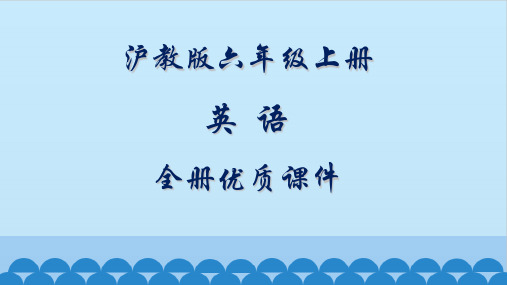
was a green apple. It ____
is red apple. It ___a
>>Practice
Look and say
1 2
3
4
>>Practice Look and say
My friend I have a friend. Her name is Carol. When she was six years old, she was a cute girl.
helps sick people. I like my friend.
>>Practice Think and write
My friend
I have a friend. _____ name is _____. When she/he was ___ years old, she/he was _____. In this picture, she/he was _____ years old. She/he was in _______.
She/he was a _____ girl/boy.
Now she/he is _____ years old. Her /His _____ is/are ______. She/he is a/an _____. She/He _____. I like my friend.
>>Summary
>>Presentation
Listen and say
1. How was she when she was … years old? 2. How is she now?
>>Presentation Listen and say
六年级上册单词、课文中译英(上海版牛津英语)
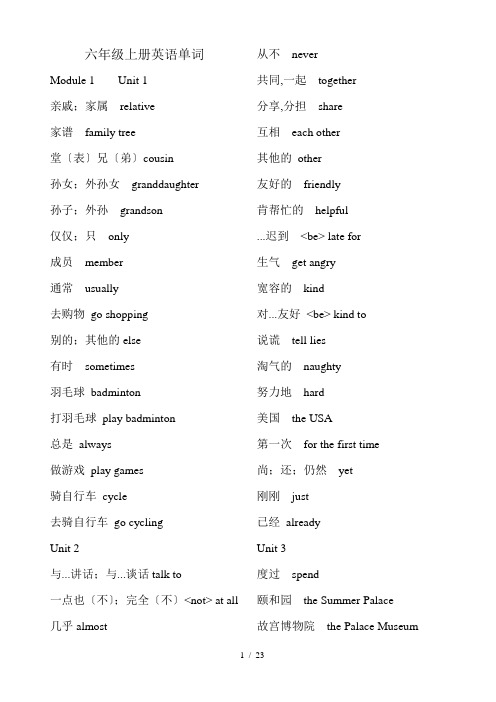
loudly
Module 3 Unit 1
dinner
tonight
seafood
steamed prawns
garlic
also
soup
kind
tomato
favourite
fried eggs
bacon
menu
salad
wing
meat
boiled eggs
bought
any
frozen
我的朋友喜欢我.
我的朋友是一只小狗.她只有三岁.
艾丽丝和凯迪是好朋友.
她们喜欢在一起.她们总是一起玩.
她们总是一起玩.她们总是一起吃午饭.
总是分享她们的食物.她们总是互相帮助.
她们总是一起步行去学校.
她们也总是帮助别人.艾丽丝是我的好朋友.
她总是很友好而且乐于助人.她学习努力.
她上学从不迟到.她从不生气.
温妮:是的,我已经去过那儿.
艾丽丝:水上世界怎么样?你去过那儿吗?
温妮:不,我还没去过那儿.我星期六准备去那儿.
Unit3 Spending a day out together
郭老师,你通常周末干什么?
我常去王府井街购物.
王府井街离天安门广场近还是远?
它离天安门广场很近.
你通常在周末干什么?我常...在...〔地方〕.
分享,分担share
互相each other
其他的other
友好的friendly
肯帮忙的helpful
...迟到<be> late for
生气get angry
宽容的kind
对...友好<be> kind to
牛津上海版英语六年级上学期教材梳理及练习 Unit1
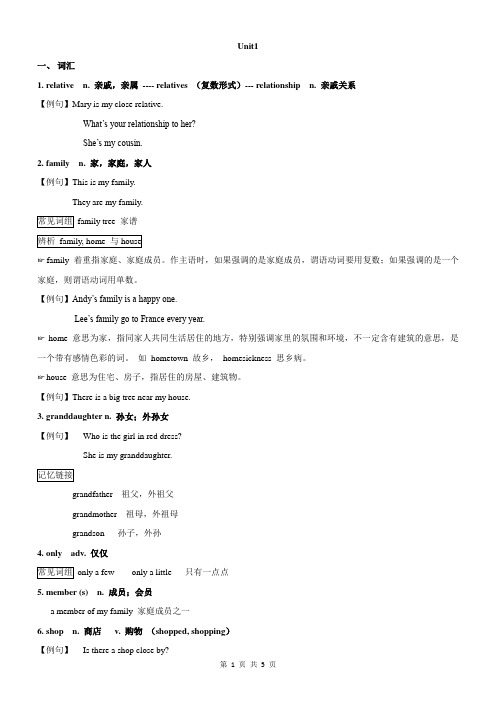
Unit1一、词汇1.relative n. 亲戚,亲属---- relatives (复数形式)--- relationship n. 亲戚关系【例句】Mary is my close relative.--- What’s your relationship to her?--- She’s my cousin.2.family n. 家,家庭,家人【例句】This is my family.They are my family.family tree 家谱☞ family 着重指家庭、家庭成员。
作主语时,如果强调的是家庭成员,谓语动词要用复数;如果强调的是一个家庭,则谓语动词用单数。
【例句】Andy’s family is a happy one.Lee’s family go to France every year.☞home 意思为家,指同家人共同生活居住的地方,特别强调家里的氛围和环境,不一定含有建筑的意思,是一个带有感情色彩的词。
如hometown 故乡,homesickness 思乡病。
☞ house 意思为住宅、房子,指居住的房屋、建筑物。
【例句】There is a big tree near my house.3. granddaughter n. 孙女;外孙女【例句】--- Who is the girl in red dress?--- She is my granddaughter.grandfather 祖父,外祖父grandmother 祖母,外祖母grandson 孙子,外孙4. only adv. 仅仅only a few only a little 只有一点点5. member (s) n. 成员;会员a member of my family 家庭成员之一6. shop n. 商店v. 购物(shopped, shopping)【例句】--- Is there a shop close by?--- Yes, there is a big shop on the right.--- I want to go shopping tomorrow.--- I’ll go with you.bookshop 书店shopping bag 购物袋shopping centre 购物中心shopping mall 大型购物商场go shopping 去购物= do some shopping 【例句】I have to go shopping this afternoon.= I have to do some shopping this afternoon. 7. else adv. 别的,其他的【例句】--- What else do you want?--- Nothing else, thank you.someone/anybody/nobody elsenothing/something/anything elsewho elsewhere elsewhat else?who else? 强调还有什么/谁...?8. badminton n. 羽毛球【例句】Tom likes playing badminton.play + 球类运动【例如】play tennis 打网球play table tennis 打乒乓球play football 踢足球play volleyball 打排球9. cycle n. 自行车v. 骑自行车【例句】They want to go there by cycle.He cycles to work every day.cycle 作名词时还有周期、循环的意思。
上海六年级英语上册知识点

上海六年级英语上册知识点Unit 1 My School LifeIn this unit, students will learn about school life and daily routines. They will be introduced to vocabulary related to subjects, classrooms, activities, and daily schedules. They will also practice simple present tense and adverbs of frequency to describe their daily routines.Unit 2 My Family and FriendsThis unit focuses on family and friendship. Students will learn to talk about their family members, describe their appearance and personalities, and discuss their relationships. They will also learn vocabulary related to hobbies and free time activities.Unit 3 My Home and NeighborhoodIn this unit, students will learn to talk about their homes and neighborhoods. They will practice describing rooms, furniture, and locations in a house. They will also learn vocabulary related to different places in a neighborhood, such as school, supermarket, park, etc.Unit 4 My Daily RoutineThis unit continues to develop the topic of daily routines. Students will learn to use time expressions to talk about their daily activities in more detail. They will also practice asking and answering questions about daily routines.Unit 5 My School SubjectsIn this unit, students will learn about different school subjects and related vocabulary. They will practice talking about their favorite subjects and expressing their opinions. Students will also learn about different school facilities and activities.Unit 6 My Body and HealthThis unit focuses on body parts and health. Students will learn to describe body parts, talk about health problems, and give advice. They will also learn vocabulary related to sports and healthy lifestyle.Unit 7 My Favorite ThingsIn this unit, students will learn to talk about their favorite things, such as colors, animals, foods, etc. They will practice using comparative and superlative forms to express their preferences. Students will also learn to give reasons and opinions.Unit 8 My Holiday PlansThis unit introduces vocabulary and expressions related to holidays and travel. Students will learn to talk about their holiday plans, destinations, transportation, and activities. They will also practice using future tense to talk about future events.Unit 9 My CommunityThis unit focuses on the community and the environment. Students will learn to talk about places in a community, such as library, museum, etc. They will also learn about environmental issues and practice using should/shouldn't to give suggestions.Unit 10 My FutureIn the final unit of the book, students will learn to talk about their future plans and dreams. They will practice using will/won't and going to to express future intentions. Students will also learn vocabulary related to jobs and careers.Each unit in the Shanghai sixth-grade English textbook covers specific topics and language skills to help students develop their English proficiency. By the end of the book, students will haveacquired a solid foundation in English language and be able to communicate effectively in various real-life situations.Remember to review regularly, practice speaking and listening, and have fun learning English!。
牛津上海版英语六年级上学期Module 1 Family and friends Uni
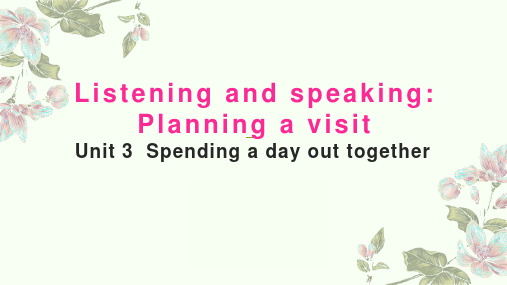
• Before going on a trip with your family or friends, what do you need to think about first?
• When? • What time? • Which place? • How to get there? • How much?
How are we going to get there?
Let’s go by ; v.原形…
How much does it cost? 将要做…
taking a bus to Ocean Park
When are we going to come back?
10:00 = 10 a.m. = 10 o’clock in the morning
Listening and speaking: Planning a visit
Unit 3 Spending a day out together
• Have you been on a one-day trip (旅行) with your • Wfamheilrye?do you usually go on a trip with your family? • Where do you usually go on a trip with your friends?
Plan (计划) a trip !
• date • time • place • way • cost
/kɒst/ v. 花费 n. 花费
• What do they talk about?
• When? • What time? • Which place? • How to get there?
上海市小学六年级第一学期英语(牛津上海版)教材教案课堂单词记忆课件(例句版)Unit 9 Picnics are fun
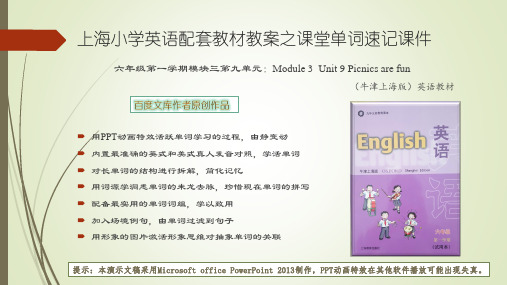
来源:源自西非某土著语言, 其果实为Coca-Cola重要原 材料。
词组: Coca Cola 可口可乐(美国饮料品牌)
Pesi Cola 百事可乐(美国饮料品牌)
例句:I drank too much cola last night. We have coffee, tea, juice, cola, beer and cocktails.
提示:本演示文稿采用Microsoft office PowerPoint 2013 制作,PPT动画特效在其他软件播放可能出现失真。
来源:源自中古英语fonnen, 意为傻瓜,糊弄,引申词义 为享乐。
词组:have fun 玩得开心,玩得高兴 good fun 很有意思
例句:There’s plenty of fun for all the family. You can have happiness and fun.
来源:源自古英语的sprædan,意为铺开。 词组: spread out 展开;伸张
spread sth. over/across/on sth. 把某物铺/
摊在某物上
例句:I spread butter on my toast.
She spread the bread with butter.
词组: salty water 盐水 salty foods 咸味食物 例句:The dish is too salty. I like French fries because they are salty..
来源:源自纳瓦特尔语chilli, 意为辣椒。
词组: chili pepper 红辣椒 chili powder 辣椒粉
例句:The Grapes are sour!
牛津上海版小学英语六年级上册(英语单词表)
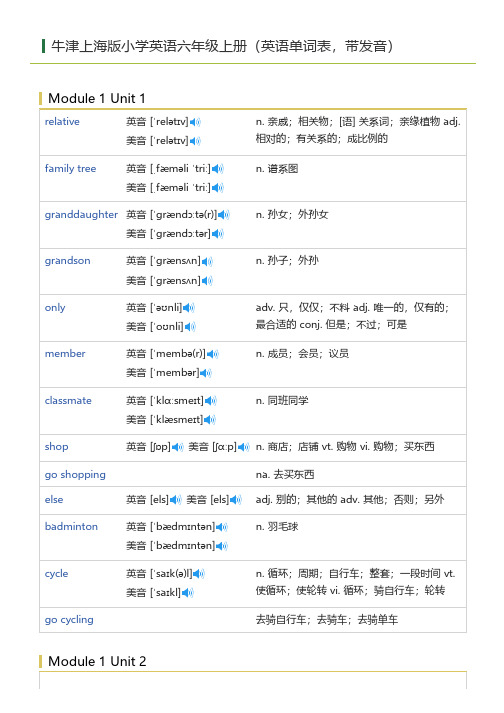
牛津上海版小学英语六年级上册(英语单词表,带发音)Module 1 Unit 1Module 1 Unit 2relative英音 [ˈrel ət ɪv]美音 [ˈrel ət ɪv]n. 亲戚;相关物;[语] 关系词;亲缘植物 adj.相对的;有关系的;成比例的family tree英音 [ˌfæm əli ˈtri ː]美音 [ˌfæm əli ˈtri ː]n. 谱系图granddaughter 英音 [ˈɡrænd ɔːt ə(r)]美音 [ˈɡrænd ɔːt ər]n. 孙女;外孙女grandson英音 [ˈɡræns ʌn]美音 [ˈɡræns ʌn]n. 孙子;外孙only英音 [ˈəʊnli]美音 [ˈo ʊnli]adv. 只,仅仅;不料 adj. 唯一的,仅有的;最合适的 conj. 但是;不过;可是member英音 [ˈmemb ə(r)]美音 [ˈmemb ər]n. 成员;会员;议员classmate英音 [ˈklɑːsme ɪt]美音 [ˈklæsme ɪt]n. 同班同学shop 英音 [ʃɒp]美音 [ʃɑːp]n. 商店;店铺 vt. 购物 vi. 购物;买东西go shopping na. 去买东西else 英音 [els]美音 [els]adj. 别的;其他的 adv. 其他;否则;另外badminton英音 [ˈbædm ɪnt ən]美音 [ˈbædm ɪnt ən]n. 羽毛球cycle 英音 [ˈsa ɪk(ə)l]美音 [ˈsa ɪkl]n. 循环;周期;自行车;整套;一段时间 vt.使循环;使轮转 vi. 循环;骑自行车;轮转go cycling去骑自行车;去骑车;去骑单车almost英音 [ˈɔːlməʊst]美音 [ˈɔːlmoʊst]adv. 差不多,几乎never英音 [ˈnevə(r)]美音 [ˈnevər]adv. 从未;决不other英音 [ˈʌðə(r)]美音 [ˈʌðər]adj. 其他的,另外的 pron. 另外一个each other pron. 彼此friendly英音 [ˈfrendli]美音 [ˈfrendli]adj. 友好的;亲切的;支持的;融洽的,和睦的 adv. 友善地;温和地helpful英音 [ˈhelpfl]美音 [ˈhelpfl]adj. 有帮助的;有益的naughty英音 [ˈnɔːti]美音 [ˈnɔːti]adj. 顽皮的,淘气的;不听话的;没规矩的;不适当的;下流的lie英音 [laɪ]美音 [laɪ]vi. 躺;说谎;位于;展现 vt. 谎骗 n. 谎言;位置ocean英音 [ˈəʊʃ(ə)n]美音 [ˈoʊʃn]n. 海洋;大量;广阔yet 英音 [jet]美音 [jet]conj. 但是;然而 adv. 还;但是;已经just英音 [dʒʌst]美音 [dʒʌst]adv. 只是,仅仅;刚才,刚刚;正好,恰好;实在;刚要 adj. 公正的,合理的;正直的,…already英音 [ɔːlˈredi]美音 [ɔːlˈredi]adv. 已经,早已;先前Earth英音 [ɜːθ]美音 [ɜːrθ]n. 地球;地表,陆地;土地,土壤;尘事,俗事;兽穴 vt. 把(电线)[电] 接地;盖…look after英音 [lʊk ˈɑːftə(r)]美音 [lʊk ˈæftər]na. 照看;照顾;看管;对…负责environment英音 [ɪnˈvaɪrənmənt]美音 [ɪnˈvaɪrənmənt]n. 环境,外界Module 3 Unit 8pollute 英音 [p əˈlu ːt]美音 [p əˈlu ːt]vt. 污染;玷污;败坏pollution 英音 [p əˈlu ːʃ(ə)n]美音 [p əˈlu ːʃn]n. 污染 污染物land 英音 [lænd]美音 [lænd]n. 国土;陆地;地面 vt. 使…登陆;使…陷于;将…卸下 vi. 登陆;到达keep 英音 [ki ːp]美音 [ki ːp]vt. 保持;经营;遵守;饲养 vi. 保持;继续不断 n. 保持;生计;生活费pick up v. 拾起;探出;重新开始into英音 [ˈɪnt ə]美音 [ˈɪnt ə; ˈɪntu; ˈɪntu ː]prep. 到…里;深入…之中;成为…状况;进入到…之内rubbish bin 垃圾桶;垃圾箱;垃圾筒leave英音 [li ːv]美音 [li ːv]vt. 离开;留下;遗忘;委托 vi. 离开,出发;留下 n. 许可,同意;休假promise 英音 [ˈpr ɒm ɪs]美音 [ˈprɑːm ɪs]n. 许诺,允诺;希望 vt. 允诺,许诺;给人以…的指望或希望 vi. 许诺;有指望,有前途discuss 英音 [d ɪˈsk ʌs]美音 [d ɪˈsk ʌs]vt. 讨论;论述,辩论reuse 英音 [ˌri ːˈju ːz]美音 [ˌri ːˈju ːz]n. 重新使用,再用 vt. 再使用kind英音 [ka ɪnd]美音 [ka ɪnd]n. 种类;性质 adj. 和蔼的;宽容的;令人感激的menu英音 [ˈmenju ː]美音 [ˈmenju ː]n. 菜单 饭菜cabbage英音 [ˈkæb ɪd ʒ]美音 [ˈkæb ɪd ʒ]n. 卷心菜,甘蓝菜,洋白菜;(俚)脑袋;(非正式、侮辱)植物人(常用于英式英…garlic英音 [ˈɡɑːl ɪk]n. 大蒜;蒜头美音 [ˈɡɑːrlɪk]noodle英音 [ˈnuːd(ə)l]美音 [ˈnuːd(ə)l]n. 面条;笨蛋seafood英音 [ˈsiːfuːd]美音 [ˈsiːfuːd]n. 海鲜;海味;海产食品steam英音 [stiːm]美音 [stiːm]n. 蒸汽;精力 adj. 蒸汽的 vt. 蒸,散发;用蒸汽处理 vi. 蒸,冒水汽prawn英音 [prɔːn]美音 [prɔːn]n. 对虾,明虾 vi. 捕虾also英音 [ˈɔːlsəʊ]美音 [ˈɔːlsoʊ]conj. 并且;另外 adv. 也;而且;同样kind英音 [kaɪnd]美音 [kaɪnd]n. 种类;性质 adj. 和蔼的;宽容的;令人感激的fry英音 [fraɪ]美音 [fraɪ]n. 鱼苗;油炸食物 vt. 油炸;油煎 vi. 油炸;油煎bacon英音 [ˈbeɪkən]美音 [ˈbeɪkən]n. 咸肉;腌肉;熏猪肉boil英音 [bɔɪl]美音 [bɔɪl]n. 沸腾,煮沸;疖子 vt. 煮沸,烧开;使…激动;使…蒸发 vi. 煮沸,沸腾;激动,激昂wing英音 [wɪŋ]美音 [wɪŋ]n. 翼;翅膀;飞翔;派别;侧厅,耳房,厢房vt. 使飞;飞过;空运;增加…速度;装以翼…stall英音 [stɔːl]美音 [stɔːl]n. 货摊;畜栏;托辞 vt. 拖延;使停转;使陷于泥中 vi. 停止,停转;拖延section英音 [ˈsekʃn]美音 [ˈsekʃn]n. 截面;部分;部门;地区;章节 vt. 把…分段;将…切片;对…进行划分 vi. 被切割成片…frozen英音 [ˈfrəʊz(ə)n]美音 [ˈfroʊzn]v. 结冰(freeze的过去分词);凝固;变得刻板 adj. 冻结的;冷酷的packet英音 [ˈpækɪt]美音 [ˈpækɪt]n. 数据包,信息包;小包,小捆 vt. 包装,打包Module 1 Unit 3bake 英音 [be ɪk]美音 [be ɪk]n. 烤;烘烤食品 vi. 烘面包;被烤干;受热 vt.烤,烘焙hamburger 英音 [ˈhæmb ɜːɡə(r)]美音 [ˈhæmb ɜːrɡər]n. 汉堡包,火腿汉堡;牛肉饼,肉饼;碎牛肉spend英音 [spend]美音 [spend]n. 预算 vt. 度过,消磨(时光);花费;浪费;用尽 vi. 花钱;用尽,耗尽island英音 [ˈa ɪl ənd]美音 [ˈa ɪl ənd]n. 岛;岛屿;安全岛;岛状物 adj. 岛的 vt. 孤立;使成岛状bay英音 [be ɪ]美音 [be ɪ]n. 海湾;狗吠声 vt. 向…吠叫 vi. 吠叫;大声叫嚷dragon英音 [ˈdræɡən]美音 [ˈdræɡən]n. 龙;凶暴的人,凶恶的人;严厉而有警觉性的女人weekend英音 [ˌwi ːk ˈend]美音 [ˈwi ːkend]n. 周末,周末休假;周末聚会 adj. 周末的,周末用的 vi. 度周末seaside英音 [ˈsi ːsa ɪd]美音 [ˈsi ːsa ɪd]n. 海边;海滨 adj. 海边的;海滨的lucky英音 [ˈl ʌki]美音 [ˈl ʌki]adj. 幸运的;侥幸的market英音 [ˈmɑːk ɪt]美音 [ˈmɑːrk ɪt]n. 市场;行情;股票市场;市面;集市;销路;商店 vt. 在市场上出售 vi. 做买卖space英音 [spe ɪs]美音 [spe ɪs]n. 空间;太空;距离 vt. 隔开 vi. 留间隔museum英音 [mju ˈzi ːəm]美音 [mju ˈzi ːəm]n. 博物馆activity英音 [æk ˈt ɪv əti]美音 [æk ˈt ɪv əti]n. 活动;行动;活跃barbecue英音 [ˈbɑːb ɪkju ː]n. 烤肉;吃烤肉的野宴 vt. 烧烤;烤肉Module 2 Unit 4美音 [ˈbɑːrb ɪkju ː]kite英音 [ka ɪt]美音 [ka ɪt]n. 风筝 vi. 使用空头支票;像风筝一样飞;轻快地移动 vt. 骗钱;涂改(支票)sandcastle英音 [ˈsændkɑːsl]美音 [ˈsændkæsl]n. 沙塔collect英音 [k əˈlekt]美音 [k əˈlekt]vt. 收集;募捐 adj. 由收件人付款的 vi. 收集;聚集;募捐 adv. 由收件人付款地album英音 [ˈælb əm]美音 [ˈælb əm]n. 相簿;唱片集;集邮簿;签名纪念册plan英音 [plæn]美音 [plæn]n. 计划;平面图 vt. 计划;设计;打算 vi. 计划;打算shall英音 [ʃəl; ʃæl]美音 [ʃəl; ʃæl]aux. 应;会;将;必须o'clock abbr. …点钟(等于of the clock)cost英音 [k ɒst]美音 [k ɔːst]n. 费用,代价,成本;损失 vt. 花费;使付出;使花许多钱 vi. 花费trip英音 [tr ɪp]美音 [tr ɪp]n. 旅行;绊倒;差错 vt. 绊倒;使犯错 vi. 绊倒;远足;犯错误;轻快地走secretary英音 [ˈsekr ət(ə)ri]美音 [ˈsekr əteri]n. 秘书;书记;部长;大臣bank英音 [bæŋk]美音 [bæŋk]n. 银行;岸;浅滩;储库 vt. 将…存入银行;倾斜转弯 vi. 堆积;倾斜转弯clerk英音 [klɑːk]美音 [kl ɜːrk]n. 职员,办事员;店员;书记;记账员;<古>牧师,教士 vi. 当销售员,当店员;当职员policewoman英音 [p əˈli ːsw ʊm ən]美音 [p əˈli ːsw ʊm ən]n. 女警察;女警官dentist英音 [ˈdent ɪst]n. 牙科医生 牙医诊所Module 2 Unit 5pilot英音 [ˈpa ɪl ət]美音 [ˈpa ɪl ət]n. 飞行员;领航员 adj. 试点的 v. 驾驶;领航;试用fireman英音 [ˈfa ɪəm ən]美音 [ˈfa ɪərm ən]n. 消防队员;救火队员;锅炉工postman英音 [ˈp əʊstm ən]美音 [ˈpo ʊstm ən]n. 邮递员;邮差shop assistant n. 店员;售货员person英音 [ˈp ɜːs(ə)n]美音 [ˈp ɜːrsn]n. 人;身体;容貌,外表;人称teach 英音 [ti ːt ʃ]美音 [ti ːt ʃ]vt. 教;教授;教导 vi. 教授;讲授;当老师put out v. 扑灭;熄灭;放出;伸出interview英音 [ˈɪnt əvju ː]美音 [ˈɪnt ərvju ː]n. 接见,采访;面试,面谈 vt. 采访;接见;对…进行面谈;对某人进行面试find out na. 查出;发现;看清…的面目;识破if英音 [ɪf]美音 [ɪf]conj. (表条件)如果;即使;是否;(表假设)假如 n. 条件;设想finish英音 [ˈf ɪn ɪʃ]美音 [ˈf ɪn ɪʃ]n. 结束;完美;回味(葡萄酒) vt. 完成;结束;用完 vi. 结束,终止;终结age英音 [e ɪd ʒ]美音 [e ɪd ʒ]n. 年龄;时代;寿命,使用年限;阶段 vt. 使成熟;使变老,使上年纪 vi. 成熟;变老programme英音 [ˈpr əʊɡræm]美音 [ˈpro ʊɡræm]n. 计划,规划;节目;程序 vt. 规划;拟…计划 vi. 编程序;制作节目entrance英音 [ˈentr əns]美音 [ˈentr əns; ɪn ˈtræns]n. 入口;进入 vt. 使出神,使入迷choir英音 [ˈkwa ɪə(r)]n. 唱诗班;合唱队;舞蹈队 vt. 合唱 vi. 合唱noticeboard英音 [ˈnəʊtɪsbɔːd]美音 [ˈnoʊtɪsbɔːrd]n. 布告栏;警告牌parent英音 [ˈpeərənt]美音 [ˈperənt]n. 父亲(或母亲);父母亲;根源arrive英音 [əˈraɪv]美音 [əˈraɪv]vi. 到达;成功;达成;出生first英音 [fɜːst]美音 [fɜːrst]num. 第一 n. 第一;开始;冠军 adj. 第一的;基本的;最早的 adv. 第一;首先;优…classroom英音 [ˈklɑːsruːm]美音 [ˈklæsruːm; ˈklæsrʊm]n. 教室next 英音 [nekst]美音 [nekst]adv. 然后;下次;其次 adj. 下一个的;其次的;贴近的 n. 下一个 prep. 靠近;居于…之后project英音 [ˈprɒdʒekt]美音 [ˈprɑːdʒekt]n. 工程;计划;事业 vt. 设计;计划;发射;放映 vi. 设计;计划;表达;投射craft英音 [krɑːft]美音 [kræft]n. 工艺;手艺;太空船 vt. 精巧地制作club英音 [klʌb]美音 [klʌb]n. 俱乐部,社团;夜总会;棍棒;(扑克牌中的)梅花 adj. 俱乐部的 vt. 用棍棒打;募集 …finally英音 [ˈfaɪnəli]美音 [ˈfaɪnəli]adv. 最后;终于;决定性地ground英音 [ɡraʊnd]美音 [ɡraʊnd]n. 地面;土地;范围;战场;根据 v. 研磨(grind的过去分词);压迫 adj. 土地的;…invitation英音 [ˌɪnvɪˈteɪʃn]美音 [ˌɪnvɪˈteɪʃn]n. 邀请;引诱;请帖;邀请函yesterday英音 [ˈjestədeɪ]美音 [ˈjestərdeɪ; ˈjestərdi]n. 昨天;往昔 adv. 昨天Module 2 Unit 6travel英音 [ˈtræv(ə)l]美音 [ˈtrævl]n. 旅行;游历;漫游 vt. 经过;在…旅行 vi. 旅行;行进;步行;交往about英音 [əˈbaʊt]美音 [əˈbaʊt]prep. 关于;大约 n. 大致;粗枝大叶;不拘小节的人 adj. 在附近的;四处走动的;在起作…minute英音 [ˈmɪnɪt]美音 [ˈmɪnɪt]n. 分,分钟;片刻,一会儿;备忘录,笔记;会议记录 vt. 将…记录下来 adj. 微小的,详…ferry英音 [ˈferi]美音 [ˈferi]n. 渡船;摆渡;渡口 vt. (乘渡船)渡过;用渡船运送;空运 vi. 摆渡;来往行驶hour英音 [ˈaʊə(r)]美音 [ˈaʊər]n. 小时;钟头;课时;…点钟half an hour na. 半小时;a half hour 半小时hotel英音 [həʊˈtel]美音 [hoʊˈtel]n. 旅馆,饭店;客栈 vt. 使…在饭店下榻 vi. 进行旅馆式办公advertisement英音 [ədˈvɜːtɪsmənt]美音 [ˌædvərˈtaɪzmənt]n. 广告,宣传board英音 [bɔːd]美音 [bɔːrd]n. 董事会;木板;甲板;膳食 vt. 上(飞机、车、船等);用板盖上;给提供膳宿 vi. 寄宿a few na. 几个;〔反语〕很多;〈俚〉一点点a lot of det. 许多when 英音 [wen]美音 [wen]conj. 考虑到;既然;当…时;在…时;如果 n.时间,时候;日期;场合 adv. 什么时候,何…light rail na. 轻轨departmentstoren. 百货公司;大百货商店kindergarten英音 [ˈkɪndəɡɑːt(ə)n]美音 [ˈkɪndərɡɑːrt(ə)n]n. 幼儿园;幼稚园housing estate英音 [ˈhaʊzɪŋ ɪsteɪt]美音 [ˈhaʊzɪŋ ɪsteɪt]n. (统建的)住宅区Module 2 Unit 7temple 英音 [ˈtemp(ə)l]美音 [ˈtempl]n. 庙宇;寺院;神殿;太阳穴rule英音 [ru ːl]美音 [ru ːl]n. 统治;规则 vt. 统治;规定;管理;裁决;支配 vi. 统治;管辖;裁定wait for na. 等;等待enter英音 [ˈent ə(r)]美音 [ˈent ər]n. [计] 输入;回车 vt. 进入;开始;参加 vi.参加,登场;进去loudly英音 [ˈla ʊdli]美音 [ˈla ʊdli]adv. 大声地,响亮地mean英音 [mi ːn]美音 [mi ːn]adj. 平均的;卑鄙的;低劣的;吝啬的 vt. 意味;想要;意欲 n. 平均值 vi. 用意lift英音 [l ɪft]美音 [l ɪft]vt. 举起;提升;鼓舞;空运;抄袭 vi. 消散;升起;耸立 n. 电梯;举起;起重机;搭车escalator英音 [ˈesk əle ɪt ə(r)]美音 [ˈesk əle ɪt ər]n. (美)自动扶梯;电动扶梯on the left 在左边;在左侧;在右边on the right 在右边;在右侧;在右面centre英音 [ˈsent ə(r)]美音 [ˈsent ər]n. 中心 adj. 中央的 vt. 集中;将…放在中央 vi.以…为中心exit英音 [ˈeks ɪt]美音 [ˈeks ɪt; ˈeɡz ɪt]n. 出口,通道;退场 vi. 退出;离去upstairs英音 [ˌʌp ˈste əz]美音 [ˌʌp ˈsterz]n. 楼上 adj. 楼上的 adv. 在楼上,向楼上;上楼;往楼上middle英音 [ˈm ɪd(ə)l]美音 [ˈm ɪd(ə)l]adj. 中间的,中部的;中级的,中等的 n. 中间,中央;腰部in the middle 在中间;在中部;夹在中间chase英音 [t ʃe ɪs]n. 追逐;追赶;追击 vt. 追逐;追捕;试图赢Module 3 Unit 9美音 [tʃeɪs]得;雕镂 vi. 追逐;追赶;奔跑fun英音 [fʌn]美音 [fʌn]n. 乐趣;玩笑;有趣的人或事 adj. 供娱乐用的 vi. 开玩笑cola英音 [ˈkəʊlə]美音 [ˈkoʊlə]n. 可乐;可乐树(其子含咖啡碱)spicy英音 [ˈspaɪsi]美音 [ˈspaɪsi]adj. 辛辣的;香的,多香料的;下流的nut英音 [nʌt]美音 [nʌt]n. 螺母,螺帽;坚果;难对付的人,难解的问题 vi. 采坚果lemon英音 [ˈlemən]美音 [ˈlemən]adj. 柠檬色的 n. 柠檬snack 英音 [snæk]美音 [snæk]n. 小吃,快餐;一份,部分 vi. 吃快餐,吃点心salty英音 [ˈsɔːlti]美音 [ˈsɔːlti]adj. 咸的;含盐的chilli英音 [ˈtʃɪli]美音 [ˈtʃɪli]n. 红辣椒sour英音 [ˈsaʊə(r)]美音 [ˈsaʊər]n. 酸味;苦事 adj. 酸的;发酵的;刺耳的;酸臭的;讨厌的 vt. 使变酸;使失望 vi. 发酵…bitter英音 [ˈbɪtə(r)]美音 [ˈbɪtər]n. 苦味;苦啤酒 adj. 苦的;痛苦的;尖刻的;充满仇恨的 vt. 使变苦 adv. 激烈地;严…tasty英音 [ˈteɪsti]美音 [ˈteɪsti]adj. 美味的;高雅的;有趣的 n. 可口的东西;引人入胜的东西delicious英音 [dɪˈlɪʃəs]美音 [dɪˈlɪʃəs]adj. 美味的;可口的spread 英音 [spred]美音 [spred]n. 传播;伸展 adj. 伸展的 vt. 传播,散布;展开;伸展;铺开 vi. 传播;伸展prepare英音 [prɪˈpeə(r)]vt. 准备;使适合;装备;起草 vi. 预备;做好Module 3 Unit 10美音 [pr ɪˈper]思想准备enough英音 [ɪˈn ʌf]美音 [ɪˈn ʌf]n. 很多;充足 adj. 充足的 adv. 足够地,充足地 int. 够了!healthy英音 [ˈhelθi]美音 [ˈhelθi]adj. 健康的,健全的;有益于健康的eating英音 [ˈi ːt ɪŋ]美音 [ˈi ːt ɪŋ]n. 吃;食物 v. 吃(eat的ing形式) adj. 侵蚀的;可生食的;进餐用的diet英音 [ˈda ɪət]美音 [ˈda ɪət]n. 饮食;食物;规定饮食 vt. [医] 照规定饮食vi. 节食pyramid英音 [ˈp ɪr əm ɪd]美音 [ˈp ɪr əm ɪd]n. 金字塔;角锥体 vt. 使…渐增;使…上涨;使…成金字塔状 vi. 渐增;上涨;成金字塔状salt英音 [s ɔːlt]美音 [s ɔːlt]n. 盐;风趣,刺激性 adj. 咸水的;含盐的,咸味的;盐腌的;猥亵的 vt. 用盐腌;给…加…yogurt英音 [ˈj ɒɡət]美音 [ˈjo ʊɡərt]n. 酸奶酪,[食品] 酸乳(等于yoghurt)a little n. 一点plenty of na. 很多的fresh英音 [fre ʃ]美音 [fre ʃ]n. 开始;新生;泛滥 adj. 新鲜的;清新的;淡水的;无经验的 adv. 刚刚,才;最新地unhealthy英音 [ʌn ˈhelθi]美音 [ʌn ˈhelθi]adj. 不健康的;危险的;有害身心健康的exercise英音 [ˈeks əsa ɪz]美音 [ˈeks ərsa ɪz]n. 运动;练习;运用;操练;礼拜;典礼 vt.锻炼;练习;使用;使忙碌;使惊恐 vi. 运…countryside英音 [ˈk ʌntrisa ɪd]美音 [ˈk ʌntrisa ɪd]n. 农村,乡下;乡下的全体居民fit英音 [f ɪt]美音 [f ɪt]n. 合身;发作;痉挛 adj. 健康的;合适的;恰当的;准备好的 vt. 安装;使……适应;…stay英音 [steɪ]美音 [steɪ]n. 逗留;停止;支柱 vi. 停留;坚持;暂住;停下 vt. 坚持;暂住;抑制porridge英音 [ˈpɒrɪdʒ]美音 [ˈpɔːrɪdʒ]n. 粥,糊;麦片粥 vt. 服刑than英音 [ðən; ðæn]美音 [ðən; ðæn]conj. 比(用于形容词、副词的比较级之后);除…外(用于other等之后);与其……as ... as砷;用法;和……一样habit英音 [ˈhæbɪt]美音 [ˈhæbɪt]n. 习惯,习性;嗜好 vt. 使穿衣quiz英音 [kwɪz]美音 [kwɪz]n. 考查;恶作剧;课堂测验 vt. 挖苦;张望;对…进行测验before英音 [bɪˈfɔː(r)]美音 [bɪˈfɔːr]prep. 在…之前,先于 conj. 在…以前;在…之前 adv. 以前;在前should英音 [ʃəd; ʃʊd]美音 [ʃəd; ʃʊd]aux. 应该;就;可能;将要suggestion英音 [səˈdʒestʃən]美音 [səˈdʒestʃən; səɡˈdʒestʃən]n. 建议;示意;微量,细微的迹象。
上海沪教牛津版 六年级第一学期 英语期末复习资料

Module1 Unit11、家谱family tree2、家庭成员family member3、从某人那里得到某物get sth from sb4、许多礼物和生日卡片a lot of presents and birthday cards5、生日快乐!Happy birthday!6、做游戏play games7、打羽毛球play badminton8、踢足球play football9、去购物go shopping10、去游泳go swimming11、去骑自行车go cycling12、去一家餐馆go to a restaurant13、去公园go to the park14、看电视watch TV15、看一部电影see a film16、别的什么what else17、usually (adv)—usual (adj)经常的18、relation (n)—relative (n)亲戚immediate relative至亲;直系亲属19、cycle (v)骑自行车—cyclist (n)骑自行车的人20、cousin是指与你同辈的,堂/表兄弟姐妹21、sister/brother嫡亲的兄弟姐妹22、频度副词:always/usually/often/sometimes/seldom/rarely/hardly/never等,用How often 提问23、else与不定代词或副词(以-one, -body, -thing, -where结尾的词)连用,表示“另外、其他”的意思。
eg: Would you like something else to drink?24、else还可用在疑问代词或副词(who, what, where等)后面表示强调,意思是“还有……”eg: Who else will go to the meeting?25、also放在助动词或be动词的后面,行为动词的前面。
牛津英语上海版六年级第一学期英语中考试试题精选全文

可编辑修改精选全文完整版六年级第一学期英语中考试试题(考试时间 70 分钟,满分 100 分)Part 1 Listening (25%)I. Listen and choose the right picture (根据你听到的内容,选出相应的图片):(共6分)A B CD E FII. Listen to the dialogue and choose the best answer to the question you hear(根据你听到的对话和问题,选出最恰当的答案):(共8分)( )1.A.Yes, she is. B. No, she isn’t.C. Yes, she does.D. No, she doesn’t.( )2.A. A teacher B. A doctor C. A cook D. A policeman( )3.A. Room 203 B. Room 502 C. Room 208 D. Room 205( )4.A. In the shop B. At homeC. In the study roomD. In the library( )5.A. Go cycling with his classmates.B. Go to see a film with his classmates.C. Go shopping with his mother.D. Go to the park.( )6. A. Lucky Town B. Happy Town C. Moon Town D. North Town( )7. A. Six B. Nine C. Three D. Five( )8. A. She lives near school.B. She lives far away from school.C. She lives in the school.D. She lives near the park.III. Listen to the passage and tell whether the following statements are true or false(判断下列句子是否符合你听到的短文内容,符合的用“T”表示,不符合的用“F”表示):(共6分)( )1.Tom is living with his grandparents now.( )2.Tom’s grandparents have a big and beautiful house.( )3. His grandpa is old now, but he is still working.( )4. Tom likes to eat his grandma’s food.( )5. Tom is going to see his grandparents by bus.( )6. He is going to stay there for two months.IV. Listen to the dialogue and complete the table(听短文,然后填写下列表格):(共5分)Part Two Vocabulary and Grammar(39%)I. Choose the best answer. (选择最恰当的答案)16%( )1. Kitty likes to play ________ piano.A. aB. anC. theD. /( )2. Jim always ________ his food with her good friend, Jane.A. drinksB. sharesC. haveD. eat( )3. John is Ben’s friend. ________ hair is black.A. HeB. HimC. HisD. Hers( )4. She can’t read ________ write .A. soB. andC. butD. or( )5. Alice is friendly. She ________ gets angry.A. alwaysB. oftenC. usuallyD. never( )6. She hasn’t been to Hangzhou ________.A. alwaysB. yetC. alreadyD. just( )7. Friends of the Earth help keep the environment ________.A. dirtyB. untidyC. cleanD. quiet( )8. We promise ________ shopping bags.A. useB. to usingC. reuseD. to reuse( )9. Here is a photo ________ my family and me.A. forB. fromC. toD. of( )10. Mike and Jane want ________ a picnic next week.A. haveB. havingC. to haveD. to having( )11. ________ does the bicycle cost ?A. HowB. WhatC. How muchD. How many ( )12. Firemen ________ fires.A. put outB. put onC. put upD. put down( )13. I would like ________ our city a safe place.A. makingB. makeC. to makeD. made( )14. A: ________ your aunt’s job ? B: She’s a dentist.A. WhatB. What’sC. HowD. Why( )15. What time will Professor Wang ________ ?A. arrivedB. arriveC. arrivesD. arriving( )16. ________, Kitty got the third prize.A. FinalB. FinallyC. EarlyD. LateII. Fill in the blanks with the words in the blanks in their proper forms. (用括号中所给单词的适当形式完成下列句子)6%1. In summer, we often go ________ in the sea. (swim)2. Our teacher are always _________ to us. (friend )3. My family live on the _________ floor. (two)4. Those _________ are from Beijing. (secretary )5. Our _________. (teach ) are kind to all the students.6. I have got an ________ (invite) from Kitty. She’ll give a birthday party.III. Choose a word or an expression in the box which is the closest in meaning. ( 选择与下列各句中划线部分内容意思相近的单词或短语 )5%1.What time will you begin your Open Day?2.Don’t pollute the air, water and land.3.My friend Joe is always kind to me.4.She is showing her classmates some photos.5.We promise to keep the environment clean.IV. Rewrite the sentence as requires. (按要求改写句子)12%1. They’ll visit the classroom at two fifteen.(改为否定句)They _________ _________ the classroom at two fifteen.2. Tom’s father has breakfast at home every day.(改为一般疑问句)_________ Tom’s father _________ breakfast at home every day..3. We usually walk to school together.(保持原意不变)We usually go to school _________ _________ together.4. Ben’s home isn’t near his school. (保持原意不变)Ben’s home is _________ _________ from his school.5. We are going to have a picnic next week. (对划线部分提问)_________ are you going to _________ next week ?6. Tom lives on the twelfth floor.(对划线部分提问)_________ floor _________Tom live on ?Part Three Reading and Writing(36%)I. Reading comprehension (阅读理解):(共16分)(A)Old Jack went to see a doctor. After the doctor looked over him, he said, ”Medicine(药)won’t help you. You must have a good rest, go to a quiet place for a month, go to bed early, drink milk, walk a lot and smoke one cigarette(香烟) a day.”“OK. I’ll do everything that you say.” Old Jack said.A month later Old Jack came to see the doctor again.“Well, you look younger. ” said the doctor again.“Oh, Doctor,” said Old Jack, “I feel better now. Your advice(建议)really helped me. But I cannot do one thing. You told me to smoke one cigarette a day, and that one cigarette almost killed me at first. It’s hard for me to start smoking at my age.”Read and write True or False :5%( )1. Old Jack saw a dentist one day.( )2. The doctor looked over Jack and gave him some medicine.( )3. Jack wanted to do everything that the doctor said.( )4. Jack felt better a month later.( )5. It’s easy for Old Jack to start smoking.(B)Mr. Smith usually left his car outside his house. One night he put it there as usual(通常的) again, but when he came down the next morning to go to his office, he found that his car wasn’t there. He called the police and told them about it. They said that they would try to find the car.When Mr. Smith came home from his office that evening, the car was back again in its usual place in front of his house. He was very happy and found two concert tickets(音乐会票)and a letter in one of the seats. The letter said: We are very sorry. We took your car because of something important. Thank you for your car.Mr. And Mrs. Smith went to the concert with two tickets the next night and they enjoyed themselves very much. When they got home, they found that the thieves nearly took everything in their house.Choose the best answer: (根据短文内容,选择最恰当的答案) 5%( ) 1. Mr. Smith usually put his car _______ his house.A. insideB. far fromC. aboveD. outside( )2. The police said they _____ find the car.A. wanted toB. had toC. would try their best toD. should ( )3. Mr. Smith was happy to find ___________ in the car.A. a box and a letterB. a wine and a letterC. two tickets and a letterD. a ticket and a watch( )4. The thieves were _________men.A. helpfulB. kindC. friendlyD. clever( )5. Which is right?A.The police found the car for Mr. SmithB.Mr. Smith found the car by himselfC.The concert was very good for Mr. SmithD.The thieves nearly took everything away from Mr. Smith’s house.( C )Ann is an English girl. She lives on the second floor at 11 Oxford(牛津)Street in London. Today is her 14th birthday. She is very happy. She has got everything ready for the birthday party. She has got some big bottles of Sprite, Coke and apple juice, a big birthday cake, some biscuits and chocolates. She has also got different kinds of fruits: apples, oranges, pears and grapes. Her mother has bought some candles for her.Ann has invited a lot of friends to her party. They are coming to her home at 7 p.m. Among them is an American girl. Her name is Helen.It is about 7 p.m. now. Helen is looking for Ann’s home. But she cannot find it because the second floor in British(英国的) English is the third floor in American English. So she goes back to the ground floor.Ann is waiting for Helen. She opens the door and goes to the ground floor. There she meets Helen.Answer the following questions: (根据短文内容回答下列问题)6%1.Which city does Ann live?________________________________________________________2.How old is Ann?_________________________________________________________3.What kinds of fruits has she got for her birthday party?________________________________________________________4.When are they coming to Ann’s home?5.Why can’t Helen find Ann’s home?Because ______________________________ _______.6. Where does Ann meet Helen?________________________________________________________I1. Choose the words or expressions and complete the passage.(根据短文内容,选择最恰当的单词或词组,使语句通顺) 6%TortoisesBoys and girls in the country __(1)__ play with tortoises. When they find a little tortoises, they will __(2)___ it into a basin full of water. It is good at __(3)____. There it will live happily for a ___(4)_____time. A tortoise is a good pet. It cannot bite, because it has no __(5)____, the tortoise likes to hide. It always hides in its own shell. When it feels (6) , it will pull its head into the hard shell.()1. A. love B. enjoy C. like to D. enjoy to()2. A. take B. put C. carry D. throw()3. A. swim B. swimming C. run D. running()4. A. some B. any C. long D. short()5. A. teeth B. mouth C. legs D. paws( )6. A. happy B. afraid C. glad D. sadIII. Read the passage and fill in the blanks with proper words.(根据短文内容,写出最恰当的单词,使语句通顺,首字母已给)6%The summer holiday is coming. Mary and friends are making a p___(1)____ for the holiday. Mary is going to stay with her aunt in a____(2)____ city. During the weekdays, she wants to take some computer courses. And at weekends, she is going to the beach to have a rest. Her best friend, Jerry, is going to go camping. She is an active girl. She likes seeing the beauty of the sea. When she gets to the seaside, she wants to s___(3)____ in the sea. Mary’s another friend, Sandra, has a d___(4)_____ plan. She wants to take a part-time job in a fast food restaurant. Sandra likes meeting new people and listening to them talking. She t___(5)___ that she can both get some pocket money and learn something from the job. In another week, each of them will start their holiday and they are going to have al (6) holiday.(1)p_______(2)a_______(3)s_______(4)d_______(5)t_______ (6)lIV.Write a passage of at least 40 words about the topic “I have a good friend”(以“我有一个好朋友”为话题,写一篇不少于40个单词的短文,内容可以参考以下三个问题) 8%1.Who is your good friend?2.Why do you like him/her?3.What do you often do together?(考试时间 70 分钟,满分 100 分)Part 1 Listening (25%)1. _______2. _______3._______4. _______5. _______6._______1. ________2. ________3.________4. ________5. ________6.________7. ________8.________1. _______2. _______3._______4. _______5. _______6._______. Listen to the passage and fill in the missing words. (5%)2.__________3.__________4._________5._________2._______3._______4._______5._______6._______7.______9._______ 10._______ 11._______ 12._______ 13._______ 14.______16.______1._______2. _______3.________4. ________5. ________6.5% 1. _______ 2. ________ 3.________ 4. ________ 5. ________. Rewrite the sentence as requires. 12%_________ 2. _________ __________________ 4._________ _________5. _________ _________6. _________ _________Part 3 Reading and Writing (36%)I. Reading comprehension:(16%)A.1. _______ 2. _______ 3._______ 4. _______ 5. _______B. 1. _______ 2. _______ 3._______ 4. _______ 5. _______C. 1. _______________________________________________________________.2. _______________________________________________________________.3. _______________________________________________________________.4. _______________________________________________________________.5. Because_________________________________________________________6. _______________________________________________________________. II. Choose the words or expressions and complete the passage. 6%1. _______2. ________3.________4. ________5. ________6.III. Read the passage and fill in the blanks with proper words. 6%(1) p_______(2) a_______(3) s_______(4) d_______(5) t_______ (6) lII. Writing (8%)I have a good friend_________ _________ _________ _________ _________ _________ _________ _________ _________ _________ _________ _________ _________ _________ _________ _________ _________ _________ _________ _________ _________ _________ _________ _________ _________ _________ _________ _________ _________ _________ _________ _________ _________ _________ _________ _________ _________ _________ _________ _________ (40) _________ _________ _________ _________ _________ _________ _________ _________ _________ _________ _________ _________ _________ _________ _________ _________ _________ _________ _________ _________ _________ _________ _________ _________ _________ _________ _________ _________ _________ _________六年级第一学期英语期中考试听力文字及答案Part 1 Listening (25%)I. Listen and choose the right picture (根据你听到的内容,选出相应的图片):(共6分)1. My uncle is a cook.2. Kitty likes to play with her dog.3. My cousin often goes cycling.4. My grandpa usually watches TV after supper.5. Sometimes people pollute the environment.6. Mr. Zhang is a fireman. He puts out fires.II. Listen to the dialogue and choose the best answer to the question you hear(根据你听到的对话和问题,选出最恰当的答案):(共8分)1.W: Where is Fangfang, Li Ping?M: She is in the library.Q: Is Fangfang in the library?2.W: What does your father do, Ben?M: He cooks food for people.Q: What is Ben’s father?3.W: Is Tom’s office Room 203 or 205?M: It’s Room 205.Q: Which room is Tom’s office?4.W: May I borrow a story book?M: Ok. They are over there.Q: Where are they?5.W: What are you going to do this weekend, Tony?M: I’m going to go cycling with my classmates.Q: What is Tony going to do?6.M: Have you been to Happy Town, Winnie?W: Yes, I have.Q: Where has Winnie been?7.M: Can you see any cars, Kitty?W: Yes, I can.M: How many are there?W: There are three.Q: How many cars can Kitty see?8.M: Where does Kitty live?W: She lives in Garden City.M: Does she live near or far away from school?W: She lives near school.Q: Does Kitty live near or far away from school?III. Listen to the passage and tell whether the following statements are true or false(判断下列句子是否符合你听到的短文内容,符合的用“T”表示,不符合的用“F”表示):(共6分)Tom’s grandparents don’t live with Tom. They live in the country. They have a very big and beautiful house. His grandpa is getting old now, but he is still working. His grandma is a cook. Tom always goes to see them and he enjoys his grandma’s food very much. The winter holidays are coming. Tom is going to visit them by train. He is going to stay there for two weeks.IV. Listen to the dialogue and complete the sentences(听短文,然后填写下列表格):(共6分)Good evening, everyone. Welcome to our city. You will stay at the Garden Hotel tonight.Tomorrow, first, we’ll have breakfast at 7:10 a.m. Next, we’ll go to visit Shanghai Museum at eight. Then we’ll visit People’s Square and we’ll have lunch there. In the afternoon, at about three thirty, we’ll go to Jinmao Building. In the evening we’ll have a visit to the Huangpu River by ship.That’s all. Thank you. Good night.I.BDCEFAII. ACDD ABCAIII FTTTFFIV. 7:10 Museum/museum lunch 3:30 shipPart 2 Vocabulary and Grammar (39%)I.1-8 CBCDDBCD 9-16 DCCACBBBII.swimming, friendly, second, secretaries, teachers,invitationIII.EBDCAIV. 1. won’t visit 2. Does have 3. on foot4. far away5. What do6. Which doesPart 3 Reading and Writing (36%)I. (A) FFTTF(B) DCCDD(C)1. She lives in London.2. She is 14 (years old).3. She has got apples, oranges, pears and grapes.4. They are coming to her home at 7 p.m.5. Because the second floor in British English is the third floor in AmericanEnglish.6. She meets Helen on the ground floor.II. . CBBCABIII. plan another swim different thinks lovelyIV.略。
Unit1 period3 牛津上海版英语六年级上学期
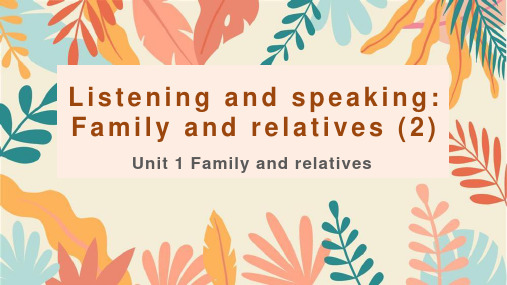
play volleyball
watch TV watch a film
v. cycle go cycling /ˈsaɪklɪŋ/
family activities
play football
play basketball
go swimming
play badminton /ˈbædmɪntən/
Homework:
校:《练习册》P4 1). U1作业卷Ex3 2). U1词汇词组卷Ex3
play (computer) games
read books
family activities
go to a restaurant
/ ˈʃɒpɪŋ/ go shopping
v. shop
go shopping play badminton
Read the dialogue after the recording.
What else do you do with her? With+人称代词
别的什么
的宾格/名词
Alice, what do you do with your aunt?
I usually go shopping with my aunt.
What else do you do with her?
SUN MON TUE WED THU FRI SAT
I sometimes go shopping with my mother.
SUN MON TUE WED THU FRI SAT
I always go diving with my cousin.
SUN MON TUE WED THU FRI SAT
adv. 频度副词
上海版英语六年级上册单词表
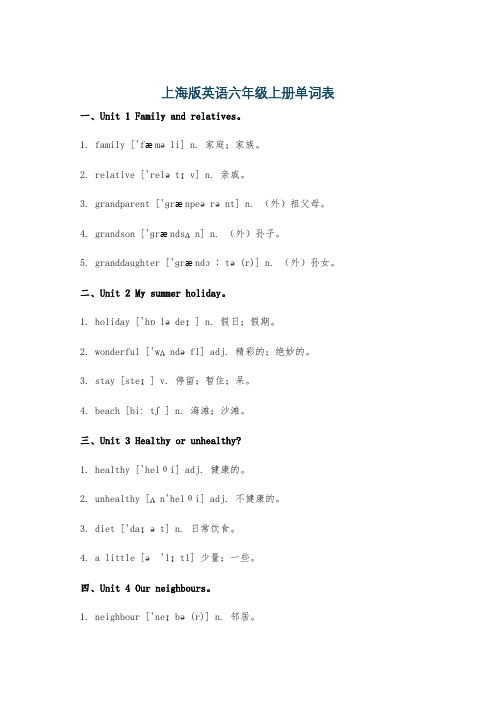
上海版英语六年级上册单词表一、Unit 1 Family and relatives。
1. family ['fæməli] n. 家庭;家族。
2. relative ['relətɪv] n. 亲戚。
3. grandparent ['ɡrænpeərənt] n. (外)祖父母。
4. grandson ['ɡrændsʌn] n. (外)孙子。
5. granddaughter ['ɡrændɔːtə(r)] n. (外)孙女。
二、Unit 2 My summer holiday。
1. holiday ['hɒlədeɪ] n. 假日;假期。
2. wonderful ['wʌndəfl] adj. 精彩的;绝妙的。
3. stay [steɪ] v. 停留;暂住;呆。
4. beach [biːtʃ] n. 海滩;沙滩。
三、Unit 3 Healthy or unhealthy?1. healthy ['helθi] adj. 健康的。
2. unhealthy [ʌn'helθi] adj. 不健康的。
3. diet ['daɪət] n. 日常饮食。
4. a little [ə 'lɪtl] 少量;一些。
四、Unit 4 Our neighbours。
1. neighbour ['neɪbə(r)] n. 邻居。
2. helpful ['helpfl] adj. 有用的;有帮助的。
3. kind [kaɪnd] adj. 和蔼的;宽容的。
4. firefighter ['faɪəfaɪtə(r)] n. 消防员。
五、Unit 5 Open Day。
1. open ['əʊpən] v. 打开;开启; adj. 开着的;开放的。
2. invitation [ˌɪnvɪ'teɪʃn] n. 邀请。
牛津上海英语六年级上册 Unit1(共40张PPT)

1
2
3
abcde f g
4
h i j k lm
5
6
nopq r s t
uvwx y z
abcd nopq
6-5
f gh
j k lm
uvwx y z
sister
1
2
3
abcde f g
4
h i j k lm
5
6
nopq r s t
uvwx y z
bcd nopq
f gh
s
u
6-6
jk
m
wx y z
Alice has got a lot of presents and
birthday cards from her family and
relatives. 1.get sth. from sb.
2. a lot of 许多
从某人处得到某物
同意:lots of
Look, write and make
Question number 6: She’s my aunt’s sister. Her daughter is my sister. Who’s she?
She’s your mother.
Question number 7: He is my father’s son. But he’s not my brother. Who’s he?
Make a birthday card
Make a birthday card for one of your family members or relatives.
Treasure Box
Option 1
Develop your vocabulary
上海牛津版英语六年级第一学期6A期末复习知识点总结1

must not
必须、很重要或必要不准,不允许或禁止
Wemust study hard.
You mustn’t leave school alone.
提问
把情态动词单独提前
Must we wait foryou?Yes,youmust ; No,youneedn’t.(非mustn’t)
花钱花时间
.spen.tw.yua.o.thi.pen...spen.tw.yua.i.buyin.thi.pen.
I spend two yuan on this pen.=I spend two yuan in buying this pen.
表示提议的句型
Shall we
Shall是情态动词+接动词原形
a little
只能修饰不可数名词,a little milk.
some
a lot of plenty of
既可修饰可数名词又可修饰不可数名词。当及可数名词连用时,只能及可数名词的复数形式连用
k. Plent.o.eggs.
someeggs. a lot of milk. Plenty of eggs.
the one on the left/right , the one in the middle =the left/right/middle one.
地点、方位表述
near离**近
far(away)from离**(很)远
直接接地点
.liv.nea.school. H.live.fa.awa.fro.school.
六年级英语(上)知识点
频度副词
频度副词
always、sometimes、usually、never
牛津沪教版英语六年级上册Unit1-Unit12全册课件-附教案

Discussion
上海教育出版社 六年级| 上册
What have we learned in this class?
上海教育出版社 六年级| 上册
Summary
Show time. Some language points. 1. on one’s mind.
2. be worried about(doing).
3. Growing up is hard.
上海教育出版社 六年级| 上册
Summary
Show time. Some language points. 4. You have been happy since I first met you.
5. wake sb up.
6. learn that way.
Teaching aims
上海教育出版社 六年级| 上册
1. To revise vocabulary and expressions to describe "Our neighbours". 2. To guess meaning from context. 3. The students are able to use the key words correctly.
What comes into your mind when talking about “growing up”?
上海教育出版社 六年级| 上册
Presentation
Learn T: Do you feel happy to grow up?
Do you want to grow up?
上海教育出版社 六年级| 上册
上海教育出版社 六年级| 上册
Part B
牛津上海版 六年级第一学期英语考点汇总
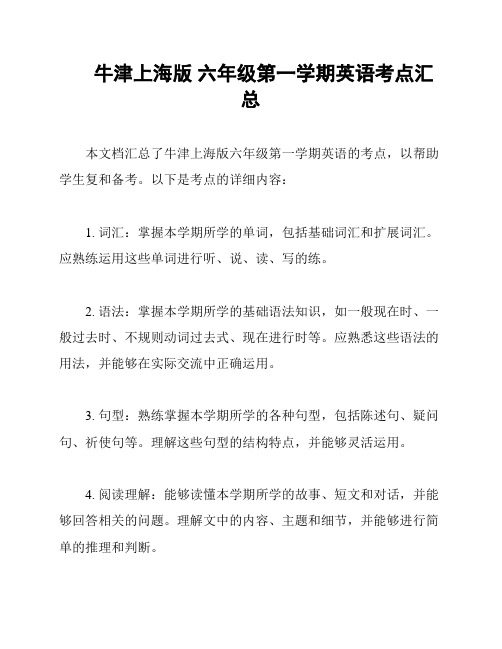
牛津上海版六年级第一学期英语考点汇
总
本文档汇总了牛津上海版六年级第一学期英语的考点,以帮助学生复和备考。
以下是考点的详细内容:
1. 词汇:掌握本学期所学的单词,包括基础词汇和扩展词汇。
应熟练运用这些单词进行听、说、读、写的练。
2. 语法:掌握本学期所学的基础语法知识,如一般现在时、一般过去时、不规则动词过去式、现在进行时等。
应熟悉这些语法的用法,并能够在实际交流中正确运用。
3. 句型:熟练掌握本学期所学的各种句型,包括陈述句、疑问句、祈使句等。
理解这些句型的结构特点,并能够灵活运用。
4. 阅读理解:能够读懂本学期所学的故事、短文和对话,并能够回答相关的问题。
理解文中的内容、主题和细节,并能够进行简单的推理和判断。
5. 听力理解:能够听懂本学期所学的对话、问答和短文,并能
够回答相关的问题。
理解听力材料中的信息、关键词和上下文,并
能够从中获取必要的信息。
6. 书写能力:书写要规范、清晰、工整。
应注意字母的大小写、大小比例和书写流畅度。
能够正确书写所学的单词、短语和句子。
7. 口语表达:能够运用所学的句型和词汇进行口语交流。
应注
意语音语调的准确性和自然流利度。
能够表达自己的观点、描述事
物和表达意愿。
希望通过对以上考点的复和总结,学生们能够在英语考试中取
得好成绩。
祝大家好运!
(Word count: 195)。
上海英语六年级上册英语书内容
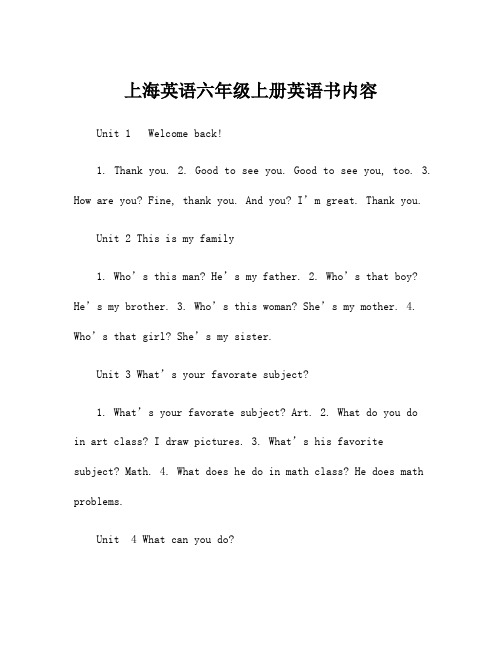
上海英语六年级上册英语书内容Unit 1 Welcome back!1. Thank you.2. Good to see you. Good to see you, too.3. How are you? Fine, thank you. And you? I’m great. Thank you.Unit 2 This is my family1. Who’s this man? He’s my father.2. Who’s that boy? He’s my brother.3. Who’s this woman? She’s my mother.4. Who’s that girl? She’s my sister.Unit 3 What’s your favorate subject?1. What’s your favorate subject? Art.2. What do you doin art class? I d raw pictures. 3. What’s his favorite subject? Math. 4. What does he do in math class? He does math problems.Unit 4 What can you do?1. I can sing.2. What else can you do? I can dance.3. What can he do? He can play the guitar.4. Can she play the drums? Yes, she can.Unit 5 What’s in the classroom?1. What’s in the classroom? There’s a blackboard.2. What else? There’s a computer.3. Is there a map? Yes, there is.4. Are there any books? Yes, there are.Unit 6 Look at the animals1. What can a cat do? It can climb.2. What can a dog do? It can run.3. What can a bird do? It can fly.4. What can a fish do? It can swim.。
沪教六年级上册英语书
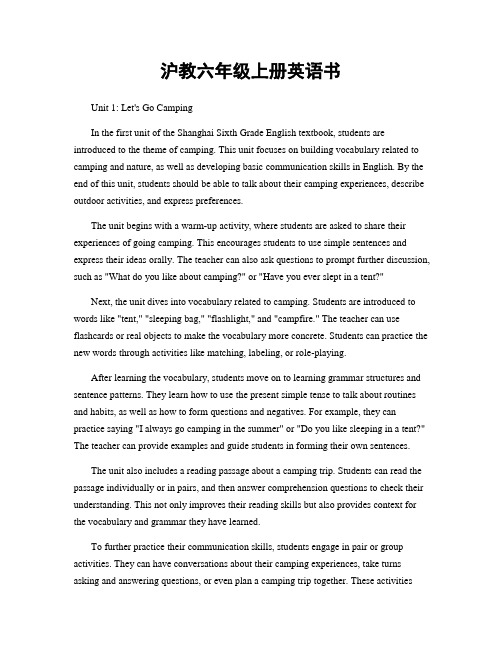
沪教六年级上册英语书Unit 1: Let's Go CampingIn the first unit of the Shanghai Sixth Grade English textbook, students are introduced to the theme of camping. This unit focuses on building vocabulary related to camping and nature, as well as developing basic communication skills in English. By the end of this unit, students should be able to talk about their camping experiences, describe outdoor activities, and express preferences.The unit begins with a warm-up activity, where students are asked to share their experiences of going camping. This encourages students to use simple sentences and express their ideas orally. The teacher can also ask questions to prompt further discussion, such as "What do you like about camping?" or "Have you ever slept in a tent?"Next, the unit dives into vocabulary related to camping. Students are introduced to words like "tent," "sleeping bag," "flashlight," and "campfire." The teacher can use flashcards or real objects to make the vocabulary more concrete. Students can practice the new words through activities like matching, labeling, or role-playing.After learning the vocabulary, students move on to learning grammar structures and sentence patterns. They learn how to use the present simple tense to talk about routines and habits, as well as how to form questions and negatives. For example, they can practice saying "I always go camping in the summer" or "Do you like sleeping in a tent?" The teacher can provide examples and guide students in forming their own sentences.The unit also includes a reading passage about a camping trip. Students can read the passage individually or in pairs, and then answer comprehension questions to check their understanding. This not only improves their reading skills but also provides context for the vocabulary and grammar they have learned.To further practice their communication skills, students engage in pair or group activities. They can have conversations about their camping experiences, take turns asking and answering questions, or even plan a camping trip together. These activitiesencourage students to use the target language in a meaningful way and develop their speaking and listening skills.As a culmination of the unit, students can create a poster or a short presentation about their dream camping trip. They can use the vocabulary, grammar, and communication skills they have learned to describe the location, activities, and equipment they would need. This task allows them to apply their knowledge and showcase their understanding of the unit's content.In conclusion, the first unit of the Shanghai Sixth Grade English textbook, "Let's Go Camping," introduces students to the vocabulary, grammar, and communication skills necessary to talk about camping experiences. By providing opportunities for oral practice, reading comprehension, and creative tasks, the unit aims to develop students' overall language proficiency and their ability to express themselves in English.。
上海英语新教材六上U1-U3核心知识归纳
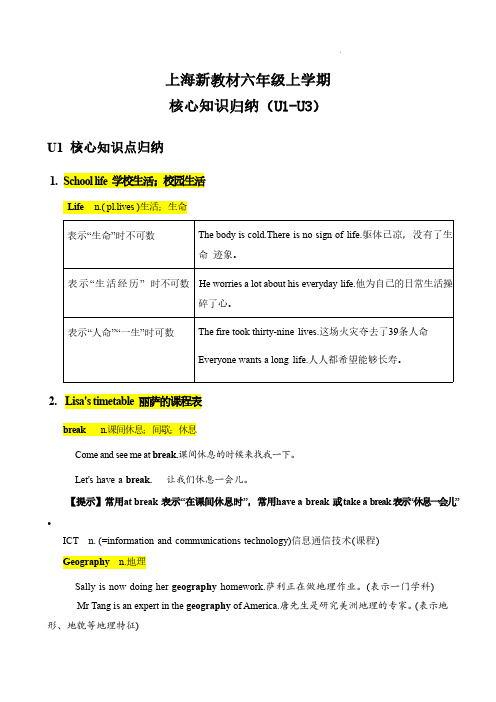
上海新教材六年级上学期核心知识归纳(U1-U3)U1核心知识点归纳1.Schoollife 学校生活;校园生活Life n.(pl.lives )生活;生命The body is cold.There is no sign of life.躯体已凉,没有了生命迹象表示“生命”时不可数。
表示“生活经历”时不可数He worries a lot about his everyday life.他为自己的日常生活操碎了心。
The fire took thirty-nine lives.这场火灾夺去了39条人命Everyone wants a long life.人人都希望能够长寿表示“人命”“一生”时可数。
2.Lisa's timetable 丽萨的课程表break n.课间休息;间歇;休息Come and see me at break.课间休息的时候来找我一下。
Let's have a break.让我们休息一会儿。
【提示】常用at break 表示“在课间休息时”,常用have a break 或take a break 表示“休息一会儿”。
ICT n.(=information and communications technology)信息通信技术(课程)Geography n.地理Sally is now doing her geography homework.萨利正在做地理作业。
(表示一门学科)Mr Tang is an expert in the geography of America.唐先生是研究美洲地理的专家。
(表示地形、地貌等地理特征)history n.历史Miss Li is a history teacher.李老师是一位历史教师。
(表示一门学科)The history of the area is very interesting.这个地区的历史很有意思。
- 1、下载文档前请自行甄别文档内容的完整性,平台不提供额外的编辑、内容补充、找答案等附加服务。
- 2、"仅部分预览"的文档,不可在线预览部分如存在完整性等问题,可反馈申请退款(可完整预览的文档不适用该条件!)。
- 3、如文档侵犯您的权益,请联系客服反馈,我们会尽快为您处理(人工客服工作时间:9:00-18:30)。
一、第一单元重点语法America [ə'merikə]n. 美国, 美洲American[ə'merikən]n. 美国人;美洲人 a. 美国的;美洲的the United States[ju'naitid steits]n. 美国,美利坚合众国Australia[ɔ:s'treiljə]n. 澳大利亚Australian[ɔ:s'treiljən]n. 澳大利亚人;澳大利亚居民a. 澳大利亚的;澳大利亚人的Britain['britən]n. 英国;大不列颠British['britiʃ]n. (总称)英国人; 英国英语a. 大不列颠的;英国的 , 英国人的, 英国英语的England['iŋglənd]n. 英国, 英格兰English['iŋgliʃ]n.英语,(总称)英国人;英格兰人a.英格兰的;英国的,英格兰人的;英国人的,英语的Canada['kænədə]n. 加拿大Canadian[kə'neidiən]n.加拿大人形容词a.加拿大的china['tʃainə] n.中国; 瓷器Chinese['tʃai'ni:z]n.中国人,中国话,汉语;中文a. 中国的,中国人的,中国话的;中文的France[frɑ:ns] n. 法兰西,法国French[frentʃ]n. 法国人;法语a. 法国的;法语的Germany['dʒə:məni]n. 德国German['dʒə:mən]n. 德国人,德语a. 德国的;德国人的,德语的India['indiə] n. 印度Indian ['ɪndɪən] n. 印度人;印第安人a. 印度的;印第安的Japan[dʒə'pæn]n. 日本Japanese[.dʒæpə'ni:z]n.日本人, 日语a.日本(人)的 ,日语的Mexico['meksikəu, 'meksi.kəu]n.墨西哥Mexican[ 'meksikən ]n. 墨西哥人,墨西哥语a. 墨西哥的,墨西哥人的二、动词后加s读音规则:1、在清辅音[p][t][k] [θ] [s][ts] [∫][t∫][tr] [f] [h] 后发音为[s],在浊辅音[b][d][g] [δ] [z][dz] [з][dз][dr] [v] [m][n][ŋ] [l] [r] [z]及元音后发音为。
如:①stop-stops [s] ; make-makes [s]②read-reads [z] ; play-plays [z]2、以辅音字母加“y”结尾的,要先将“y”变为“i”,然后在加“es”读[iz] 如:fly-flies [z];carry-carries [z]study-studies [z]; worry-worries3、以“s, x, ch, sh”结尾的,在词尾加“es”,发音为[iz] 如:teach-teaches [iz]; watch-watches [iz]4、以“o”结尾的动词,加“es”,读[z] 如:go-goes [z] do-does [z]下面几个动词变为单数时,原词的元音部分的发音发生了较大的变化,请注意记忆。
如:1、do [du:]-does [dz]2、say [sei]-says [sez]以不发音字母“e”结尾的开音节词,如果尾音是[s],[z]时,加“s”后字母“e”发音,与所加“s”一起读做[iz]。
如:close-closes [iz]重点句型1、当问别人的来自于哪里?或者国籍是有三种问法:What’s your nationality?Where are you from?Where do you come from?2、当问别人的住在哪里?当有具体的门牌号例如1、2、3时前面用介词at Live at 12 garden road. Live on garden road.What’s your home address?Where do you live?3、当问在哪里工作时?Where do you work?Who do you work for?4、help sb with sth=help sb do sth5、It’s time for sth=it’s time to do sth三、填入适当的单词,首字母已给。
1.Please answer my question . C ________on .2.Tom is our m_______.he often helps us.3.I an in Class one,J_______one。
4.We will meet at the g______of the cinema.5.Peter works very hard.he wants to m______much money.6.What s_______ do you like best at school?7.Mushrooms are my f______food.8.I’m Linda Smith .Smith is my l _______name.9.Peter often s_______the Internet on Saturday afternoons.10.Could you tell me your telephone number and home a_______.11.My father is tall,w______dark hair.12.I look l______my mother.13.Peter works in a u____________.14.My grandmother has three c_______.15.I want to m_______friends with a Chinese boy.四、将下列词组翻译成英文。
1、我班的班长________________2、在大门口___________________3、该干。
的时候了___________________4、快点赶快__________________5、第一中学_______________6、赚钱___________________________7、非常高兴做某事___________________ 8、教我们英语__________________ 9、用英语说____________________10、来自英国_________________________ 11、和某人交朋友________________ 12、在英语角________________________ 13、相互______________________ 14、姓__________________________ 15、电话号码____________________16、名______________________________ 17、欢迎会___________________ 18、帮助某人做某事_____________________ 19、与某人保持联系____________________20、来自澳大利亚_______________21、浏览因特网________________ 22、课外活动_________________________ 23、当然_________________ 24、家庭住址______________________________ 25、独生子女__________________26、看上去像我丈夫_____________________ 27、国际商用机器中国公司____________________28、一名大学生___________ 29、在后面_______________ 30、长着一双黑色的眼睛_____________________ 31、看望我的祖父母_______________ 32、给我讲讲你的家庭情况__________ 33、一位电脑工程师_________________34、看上去漂亮___________________ 35、给我邮件谈谈你的学校________________ 36想和你交朋友______________五、用动词的适当形式填空。
1、the teacher often helps_______with ______lessons after class.(we)2、Lisa wants to visit______grandparents this Saturday.(she)3、This is my____time to visit Shanghai.(one)4、Many_______are playing in the park.(child)5、Let me introduce________to you(I)6、I like _______(books(read)7、Miss Li always_______to school by bus.(go)8、The students ________an English lessons now.(have)9、Next Monday,we ______________a nice film.(see)10、Let him _______it himself.(do)11、Jack is very clever.he can work out the problem by_________(he)12、Mary is from England, she is _________(England)13、There are five________on the table(knife)14、Look! Alice __________tennis on the playground.(play)15、Mary will attend a _________tomorrow.(meet)16、Mary is from Japan.she is________(Japan)17、Kate is __________a picture on the blackboard.(draw)18、Bill comes from England,he is ________(britain)19、The students in that school often take part in the after-school ______(act)20、Tom enjoys________the internet.(surf)21、Mr’s Brown’s ______name is Tony(one)22、Mary keeps in touch with _____friends by phone.(she)23、My father______in an office.(not work)24、Tom ____(like)going to the cinema.he_______(see)a new moive this Saturday.25、Tom’s_______is french(nation)26、Red is my mother’s_______colour.(favour)27、Paul ______French every day.(study)28、He wants to be an _____(art)29、Tom is sitting between you and _____(I)30、The man over there is an ________teacher(Australia)31、I am ______in this book.(interst)32、I go to the ______corner every Saturday morning.(England)33、_____your father often _____any books for you?(buy)34、_______!the teachers are having a meeting now.(not talk)35、Where is LiHong?she___________a call phone call to her friend.(make)36、My father is an _______in the radio factory.(engine)37、They enjoyed ______at the party yesterday.(they)六、选择题。
